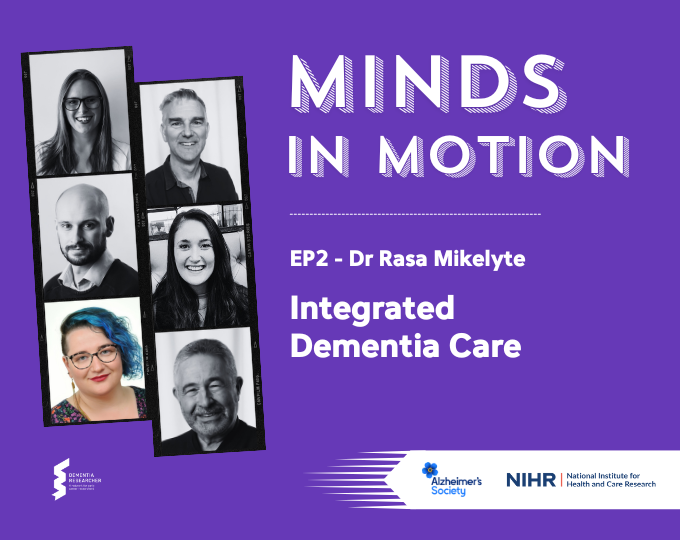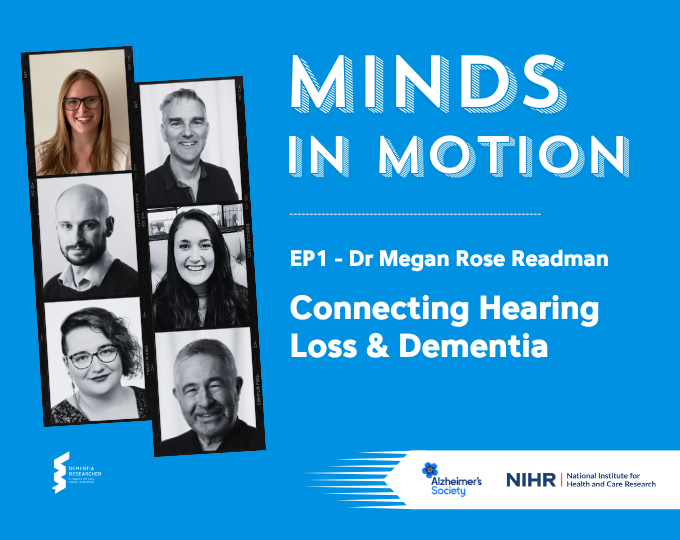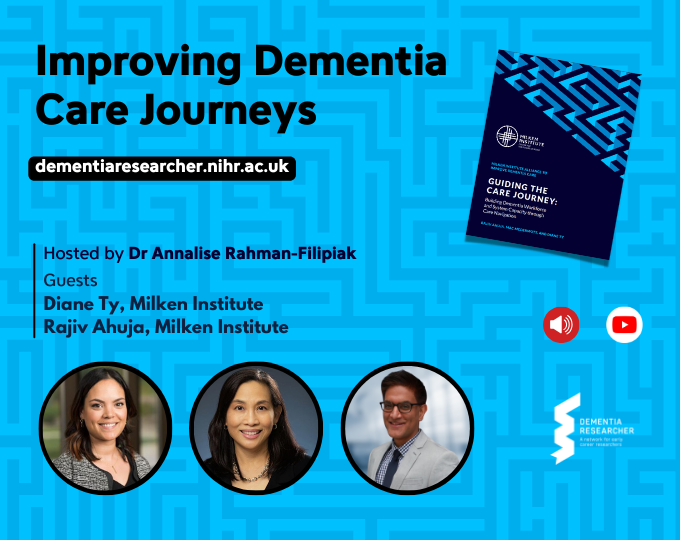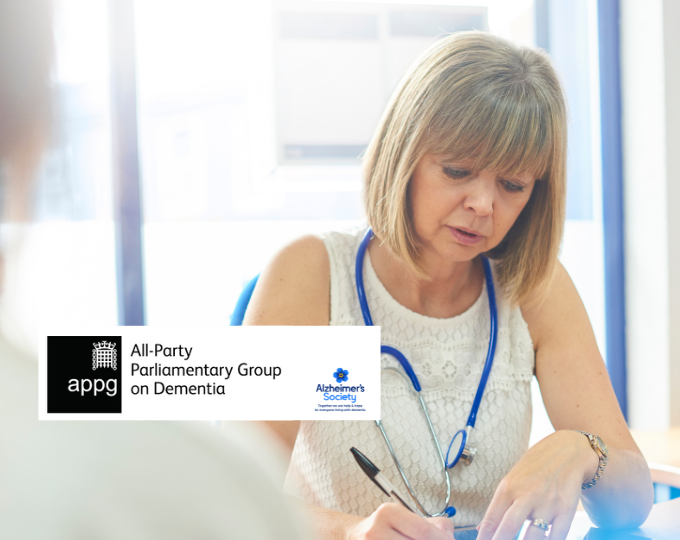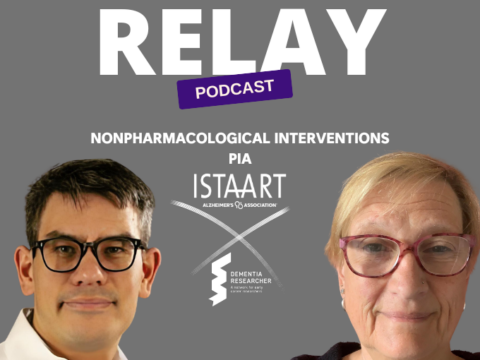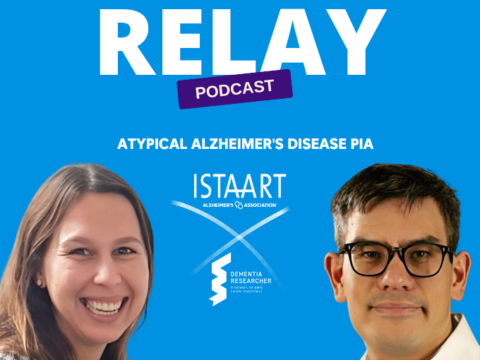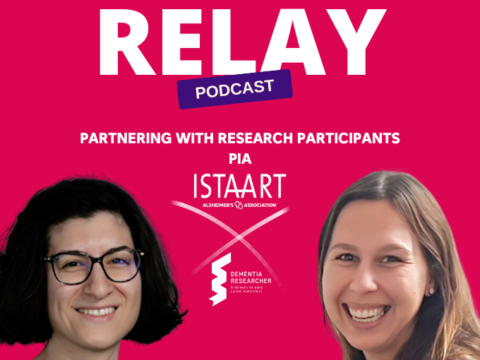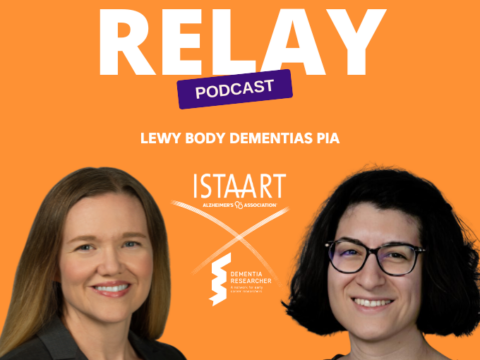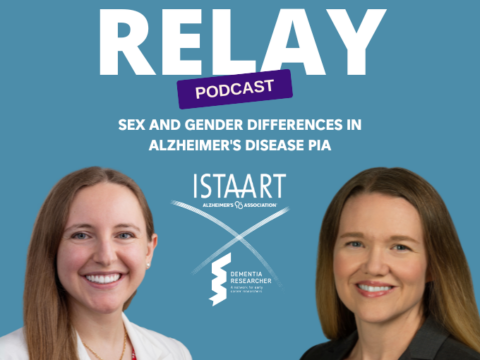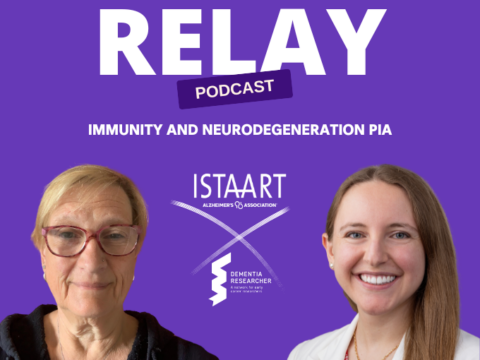The Minds in Motion Podcast from Dementia Researcher in association with the NIHR Applied Research Collaborations and Alzheimer’s Society, brings together NIHR Dem Comm Research Fellows, to talk about their research and careers.
In this first series, five of the Dem Comm Fellows each take a turn as co-host and guest. Alongside the researchers we have the incredible Trevor Salomon, Alzheimer’s Society Volunteer & Vice-Chairperson of the European Dementia Carers Working Group as our permanent co-host and anchor.
In this show Trevor is joined by Dr Rasa Mikelytė from University of Kent and NIHR ARC Kent, Surrey & Sussex to interview Dr Chris Poyner.
Chris works at the University of Birmingham and NIHR ARC West Midlands. He is leading on a project exploring life in rural areas of the West Midlands with dementia. Exploring how people living in these communities access healthcare and get a diagnosis, and how they are supported following diagnosis, and what could be done better, and how this differs from those living in urban areas.
Dem Comm is a 3 year programme funded by the National Institute of Health and Care Research and the Alzheimer's Society. It supports a new generation of dementia research leaders, bringing together researchers from different multidisciplinary backgrounds to encourage cross-cutting and community-orientated dementia research projects that can address key gaps in the evidence around dementia care and support, delivering transformative translational research.
Voice Over:
The Minds in Motion Podcast from Dementia Researcher in association with the NIHR Applied Research Collaborations and Alzheimer's Society, showcasing exciting new research and the work of the Dem Comm fellows.
Dr Rasa Mikelyte:
Hello, and welcome to the third episode of the Minds in Motion podcast from Dementia Researcher. Today, discussing dementia care support in rural communities is Dr Chris Poyner, whose name I've probably butchered, so Chris, you get to give this another goes in a minute, whose brilliant work I can't wait to hear about.
Hello, I'm Dr Rasa Mikelyte. I'm a Dem Comm research fellow in Kent, Surrey and Sussex NHR Applied Research Collaboration, the mouthful that it is, working at the University of Kent. I had the pleasure to talk about my research in the last show and today alongside my incredible co-host, Trevor Salomon, we're going to hear about more great research being delivered as part of the programme. But first, let's meet Trevor.
Trevor Salomon:
Thanks, Rasa, and it's great to be with you again. I'm Trevor Salomon. I am an Alzheimer's Society volunteer and I'm vice chair of the European Dementia Carers Working Group. My passion and my involvement are driven through the time I've spent as a full-time carer for my wife, Yvonne, who was diagnosed in 2013 with young onset Alzheimer's disease when she was just 57. I managed to look after her at home until 2019, when her double incontinence and my fatigue, meant that we needed professional care. So, she's been in an excellent care home ever since then. Through this podcast series, we've been hearing about some of the incredible research being delivered as part of the Dem Comm fellowship programme. This is an NIHR Applied Research Collaborations and Alzheimer's Society partnership, which promises to deliver the next generation social science research leaders. But for now, let's meet today's guest, Dr Chris Poyner.
Dr Chris Poyner:
Hi, everyone. I'm Chris. Rasa, you did get my name right, so don't worry about that. That was absolutely fine. So like Rasa, I'm a Dem Comm fellow. I work within the ARC West Midlands rather than Kent and Sussex, which is Rasa, I believe, unless I misheard. And my research is at the moment is looking and exploring rural communities, understanding the dementia needs in those communities, but also trying to understand what assets there are there and what strengths lie in these communities and hopefully try and develop a model or some recommendations and work with the voluntary sector to implement those and try and improve people's lives in those settings in the West Midlands.
Trevor Salomon:
And here's a nice broad question for you then, Chris. Where are you up to in this research?
Dr Chris Poyner:
Yeah, good question Trevor. So, I've just started doing the first interviews. So, I've done two interviews so far in the last week or so. They've been extremely rewarding. It's been fantastic to get back into the field and do some work with people with dementia and older people in general. The reason I wanted to do work in gerontology is during my undergraduate, I just interviewed someone who lived through the Blitz in Coventry, and they were telling me about their experiences about being underground and everything else. But what struck me about that more than anything, which is how much they enjoyed the interview process, how much they enjoyed telling their story. And I find it really rewarding to hear the stories of people with dementia and their care partners. So yeah, we've just started doing interviews at the moment. It's going okay. I think one of the hardest things to do when you're doing this sort of research with marginalised people, you've got people with dementia, and they're marginalised within themselves and then you have the rural aspect.
It's kind of like a double marginalisation to coin a terrible phrase. So, it's really hard to find these people. You also have to kind of define what you mean by rural, and you also have to be able to say it. And I really struggle to say that word, so apologies, listeners. Apologies, dear listeners, for the mispronunciation of the word rural. I've been practising but it's not seemed to have helped. So yeah, so it's hard to find people, but I'm working with the voluntary sector in trying to do so. I've also used voluntary sector to try and define what rural means. First, I was going to say anyone who lives 10 miles outside of a town or an urban centre, which is defined as any town with more than 10,000 people. But after speaking to people in the voluntary sector, they said, "Well, people tend to be isolated, especially if they don't drive from about five miles outside."
So, I've redefined that with the voluntary sector and then anyone who lives in the village as well in the 10,000 people. But I think the biggest challenge at the moment is definitely people that match inclusion criteria. And it can be difficult. You go along to coffee mornings or peer support groups and stuff and telling people about your research and you want to include everyone. But obviously you can't. Imagine one of the kind of difficulties that I'm facing as well, it's the same to people. "I would love to speak to you, but fortunately there's 10,001 people that live in your town, so you don't quite qualify."
Trevor Salomon:
And Chris, why did you choose to focus on rural communities? Did your research tell you there's a higher prevalence of cognitive impairment in those communities or dementia? What was the reason?
Dr Chris Poyner:
A few reasons, really. I think one of the main reasons is there's just no solutions out there at the moment that work for people in these communities. It's just a big unsolved problem, particularly not necessarily in the UK specifically, but there's a lack of research in the UK, which is one of the reasons I thought it would be useful to do it in the UK. So, there's a lot of rural research going on in Canada and Scandinavia and places like that, but particularly in the England, because it's seen as a very densely populated area, which it is. There's not quite so much, but there's still obviously rural pockets that need support which hopefully this research will be able to contribute towards. So, as I said, there's no real solutions and there's not enough research. So, they're the two kinds of main reasons.
Dr Rasa Mikelyte:
Thanks, Chris. That's really nicely covered. Anticipated quite a few of my questions, but worry not, there are more. One thing I've been thinking about, particularly when you spoke about the lack of research in the UK and how rural experiences can differ, is I can't step away on the aspect of affluence and how much that may play a role in rural communities. What it may be like if you have access, even if there's not public transport, you may have access to other more expensive transportation options, versus someone who's not as affluent living in rural communities. So how do you work with those aspects? You very rightly said people with dementia are marginalised already. Rurality is another aspect of marginalisation. But there are other intersections too. So how do you bring other aspects into your work, or perhaps you really nicely package it as dementia in rural areas and that's kind of it.
Dr Chris Poyner:
Yeah, I think the beauty of qualitative research is you can explore these themes with the people that you're talking to. So, I always ask people in the interviews about what I would call protective factors against some of the unmet needs that you might have in rural communities. So, one of those as you rightly you point out, is affluence. So, if you're affluent, if you are solvent financially, that will protect you from some of the burdens of living in a rural location, relative to people who are socially deprived or economically deprived. And the other thing of course like you say, is transport. So, people who can afford to drive and have that facility are less likely to have unmet need relative to other people, and they're more likely to be able to access different services as well. So, it really just comes out, I think, during the interview process. And then it's just a case of making sure you get your participant characteristics down and then just exploring that and using that to kind of age your interpretation of data.
Trevor Salomon:
If I pick up on that word affluent, Chris, which I think you just used, do we assume also that in rural affluent communities that also equals an older age group? And I know that dementia is a disease, it's not something that goes with old age, but statistically we know that older people are more likely to succumb to dementia. So, does that mean in affluent rural communities, you are likely to find this higher prevalence of dementia?
Dr Chris Poyner:
Yeah, so of course we know that in rural communities the average age is older for a general population. So, we don't have the figures for the UK, I don't think, certainly not England for the amount of people living with dementia in rural communities. But we do know obviously that there's a lot more older people there. And then it just follows essentially that there will be more people living with dementia there, which is obviously just a big concern due to the inequality of care access in those communities compared to urban centres. You do rightly point out Trevor, that there are affluent people living in rural areas. There is less economic deprivation in rural areas compared to urban areas. So that in some ways is another kind of protective factor, which seems to be a bit of a theme of the interview so far. But yeah, it's difficult.
Dr Rasa Mikelyte:
So many questions to ask from there, Chris, and I've got quite a list. But I wonder if for our listeners in particular, you've touched on this already, but if you had to summarise, what's different about rural populations and their access to dementia care?
Dr Chris Poyner:
So yeah, I think one of the really key things to point out here is it's not just formal dementia care, which people in rural communities struggle to get access to. It's informal care and support, which actually makes up the majority of support for people living with dementia. So, if you live in an isolated region of England, you're much more likely for your children to have moved away from home or even to have moved abroad. And with the people I've spoken to so far, they all have this issue where their children have either moved abroad or are miles away from where they are at the moment. So, they are on their own in terms of the people that really care about and just aren't available to support them. So that's a big issue in terms of dementia care support. Then there's obviously the distance that support would need to travel to the rural communities.
So, you have in-home care support for example. They may take longer to get there, but then once they're there they're under pressure then. So just case of it's taken so long to get here, if they've been delayed by traffic or anything, they might spend less time in the location. And then the other thing is how inflexible that kind of support tends to be for people living in the countryside, because it's like, "Okay, so you've got to come in and you're going to see me at 12 o'clock or three o'clock or six o'clock." But because it takes so long to get there, there can't be any flexibility with those times, so actually it's caught inadequate provision because what you need is crisis support or crisis intervention support. So, you've had a fall, you've got a UTI, you've got some issue like this, you need support immediately, you don't need it at three o'clock when everything's fine earlier, you need it kind of in the middle of the night.
And it's much harder for people in rural areas to get that kind of support. They're also very kind of reliant on one primary care person, so one GP, one pharmacist. So, you're really reliant on that person being good. And if they're no good, you can't get access, for example, perhaps even to a diagnosis if you're particularly old against... something I've been hearing is this kind of anecdote when I went to one of the support groups about someone's father who they tried to get a diagnosis for, and their GP was just like, "Well, he is 90, he's old, what do you expect?" And this was the kind of attitude that they were getting. So, they really struggled to get that diagnosis. Because that person was really seeing you in the primary care place as well. So, you can kind of see due to the lack of specialist provision, the reliance on a very small number of providers and the location, all these things are built upon each other. They all kind of accumulate to make things difficult for people.
Trevor Salomon:
Chris, even if that local carer support is excellent, it's going to be bandwidth-constrained, isn't it? There aren't going to be as many carers in rural communities as there are in the cities. And I don't know if this is anything you've come across. I seem to recall an Alzheimer's society report published a few years ago that said, "Because the children of people who stay in rural communities have left for the cities perhaps," and I don't know if that is a trend, "At the point of diagnosis, some of them feel they have to come and live back home because there is no local care available for their parents potentially." I don't know whether you've seen any of that or whether that's something you might expect.
Dr Chris Poyner:
Yeah, it's a really interesting kind of dynamic, isn't it, between... this happens to a lot of people with dementia or without dementia. It's typical. Parents get older and then, they're just going to mould you to look after them, and obviously you want to look after them. You love your parents. So, I think that will attract people back into the local communities to care for them. But obviously not everyone has children and not all children are able to do that, or willing to do that because a lot to sacrifice. Maybe you can't do because of work because you've got children yourself and they're settled at school, and you need to be there for them and there's 1,000,001 reasons why that might not be possible.
So, I think that's probably a minority experience rather than a majority experience. And I think people whose children are able to do that, obviously are fortunate to have that support, but I don't imagine it's typical. I think it's probably more typical for the children to make the effort and to do a lot of driving backwards and forwards and to be quite stressed out and have a lot of care burden, and to do their bit. I'm not suggesting that they don't, but I think to actually kind of give up things and move back to the communities is probably quite rare. But I don't know, Trevor.
Trevor Salomon:
So, if there aren't the plethora of local carers and if children haven't moved back home to look after parents, what have you discovered about the availability of care homes and access to care homes in rural communities, Chris? Because that would be the ultimate next stop.
Dr Chris Poyner:
Yeah, of course. And I think what I'm finding, I'm sort of dodging the questions in some way Trevor, but is people want to remain in place, and particularly in rural communities, the research does suggest that this attitude is more stoic and more... people are more resilient to this in these communities. I'm not 100% sure why that is. It might be because they feel there's more of a community to life in rural areas compared to urban areas and there may be a bit more support from the neighbours, there may be a bit more support from the people in the village. The church leader might be more involved. There just might be a bit more kind of lay support outside of the family network, which allows people to remain in place for longer. That's the only thing I can really think. But certainly, the people I've spoken to so far are very, very adamant that their partner won't be moving into a care home under any circumstances.
So, I guess everyone starts out like that to a degree and then the burden can kind of weigh way upon people, and like you've experienced, Trevor, needs get more complex. So, I am asking people a little bit to try and tease that out in the most sensitive way possible to say, "Have you considered the future and care in the future?" Someone I interviewed earlier today just kind of said, "Well, I don't want to think about that right now." And you can completely understand that perspective. It's a completely valid point of view. So that's what we're finding at the moment, Trevor, is that people want to remain in place and that. Hopefully, there are good care homes available, if necessary, that can also provide things like respite support as well. I think that's really important when we think about dementia.
Dr Rasa Mikelyte:
So, Chris, firstly, I'm getting rather miffed that your kind of anticipating my questions and answering them already. Stop that. Jokes aside, one thing I've been thinking about this is what you anticipated is that there might be some upshots too. No doubt there are very distinct challenges of living in rural communities, but perhaps some benefits, and you touched on communities, neighbours, et cetera. Work that has really influenced my thinking about dementia and living with dementia has been that of how physical space shrinks around people, including sometimes spousal or partner supporters. And I wonder if it works the same way in rural areas, where you're less able to leave the house, more and more insular within the same walls. Or actually, are you seeing narratives of people... I know you've just started interviewing, but are you seeing narratives, or have you read existing work that talks about relationship to spaces? Because people stay or move to rural communities quite often because of the green spaces, the cleaner air, the ability to be out in nature. Does that play a role, or do dementia experiences eclipse that?
Dr Chris Poyner:
I think it's important to mention, I don't think I've done this so far, that not all two rural areas are the same. So, we get one area which is maybe in the outskirts of London, which is very different to somewhere in the Shetland Islands or whatever. So, I think that's important to just make clear to begin with. It's quite complex in that way. So, it depends. I think I've definitely read research that suggests that the local community aspect and close-knit community aspect has a bit of a double-edged sword in some ways, because on one hand that support might be there for people, but also, there's the stigma and there's; I don't want people to know about this. They might withdraw. There's that kind of fear about the reaction to the diagnosis or the symptoms of dementia.
So, in some cases, I think people can get support or maybe it's a process where at first people don't want to engage with the diagnosis, they don't want to engage with the reality of what's happening. But slowly the support from the community kind of drip-feeds in and things are okay in the end, in terms of acceptance. The stigma melts away hopefully. So, I think in some cases, absolutely. I definitely know that people that I've spoken to so far have said that their social circles have shrunk, and that their opportunities for socialising are fewer and they've had to withdraw from things like dancing or playing bridge or being involved with their local football club, whatever it might be. They had to make sacrifices in order to manage their condition or help their loved one with the condition. Trevor, I'm sure you've experienced a similar kind of process with your social life, I'm sure-
Trevor Salomon:
To some extent, Chris. I think we were very lucky that we made a great effort to maintain our social lives. And our friends also made a great effort to include us. So, we didn't, if I can use the word, suffer, perhaps as other people might have done. We were just very, very lucky. I think you said in your introduction that there haven't been many studies undertaken about dementia in rural communities. I think you referred to Canada as one of them, Chris. I was wondering how interesting it might be to investigate Japan, because they were talking about culture and how revered and respected older people are. And they are definitely looked after as they get older regardless of what diseases and illnesses they succumb to. So, I'm just wondering whether our UK culture also has a role to play in how rural communities look after people living with dementia?
Dr Chris Poyner:
Yeah, I'm sure it does. I mean, what is it to be culturally British? I think it's an open book quest...
Trevor Salomon:
Stoic, Chris.
Dr Chris Poyner:
Stoic. Yeah. Is that what it is? I must have missed a memo. Yeah, I think you're right. I think there's this kind of stoicism around how an illness perhaps doesn't always help people in the UK. I think the secular nature of our society, particularly with urban areas probably doesn't help. As I say, I think the church plays a big role in villages. I don't think you realise until you actually live in one, how many people still attend. I always imagine the UK is just not many people are religious anymore, to be honest, especially white Caucasian people who tend to live in rural areas, but just isn't the case in these smaller areas in the countryside. So yeah, I think there might be something in the culture of rurality, which is supportive for people with dementia and that's what I want to tease out in the research. I want to understand what assets there for people are to tap into and I want to map that, document that, and then work with the voluntary sector as I say, to try and deliver something in that context.
Dr Rasa Mikelyte:
Can you tell us more why the main partner organisation for you or organisations are from the voluntary sector? Why has that been where your research has gone? Is it pure pragmatics or do you think that the voluntary sector is best placed to support people in rural communities and plug the gaps that public services cannot plug?
Dr Chris Poyner:
I think in the UK we've had austerity for many, many years now. Services on their knees for funding. Formal services, I mean like NHS services, stuff like this. So, I think the voluntary sector really is the only sector that can support these people at the moment. But it is also somewhat pragmatic as you point out, because they're also the people that are willing to help and I've been really supportive and, when I'm engaging with them, they're asking me to come along to their groups and providing access to people. So, they've been brilliant, and they're also really interested in the findings of the research and building upon it and trying to implement something as well. So been really fortunate with the voluntary sector organisations I've been working with. Couldn't ask for more really in terms of the support that they've been offering.
So yeah, I'm really blessed in that respect. But I do think the formal services, it's just not feasible to engage with them and expect them to be able to deliver something, or to get them to give you access to people they're providing services too. From an ethical standpoint, it's very difficult. So, there's pragmatics, but yeah, I definitely believe that private sector are the people that are going to help people in the countryside.
Trevor Salomon:
And that's against a backdrop of dementia stats showing that there's, what is it, 940,000 people living with dementia today and that's going to be up to 1.6 million by 2040? That's going to put an awful lot of pressure, isn't it, on the infrastructure of supporting rural communities in particular.
Dr Chris Poyner:
Yeah. Really what I think needs to happen is for the community themselves to take a lead on things, and I think the voluntary sector has got a natural fit to support that. So, I'd love to see things like for example, I don't know like a liaison officer in a village who's trusted and respected by the community, who can help people out. Obviously, there's going to be people who are for that and against that. We've already discussed the issues around stigma and dementia. It's a thin line between offering people support and people not being ready for support, or when people want support when they don't. It's a bit like at diagnosis. You're not going to immediately hit someone at diagnosis with Singing for the Brain group. It's not what people want to hear immediately when they get diagnosed necessarily. And I think it's the same with providing support for people in the community.
They're not necessarily always going to want it, but it would be nice for it to be there for when people are ready, and people know about it, and it becomes normalised and accepted. There are kind of small presidents for community work and the UK around. There are things like Neighbourhood Watch and stuff like this, which perhaps could work as a very kind of vague model for stuff like this, where there's more of a kind of, I guess David Cameron, would call it the big society ethos, in smaller communities, which I think would be great. It's not something we've seen happen yet.
Trevor Salomon:
I think it happened at the beginning of COVID, actually. I live in a crescent, and I think there's about 80 houses in our crescent. And like most streets, we all know that people who live either side of us and may be opposite, but honestly nobody really knew anybody else. But at the moment COVID struck and we were in lockdown, somebody set up a WhatsApp group and the first question was, do we know anybody in the street living on their own or who needs support? And so, I think your example of Neighbourhood Watch is not so farfetched, because that WhatsApp group is still in existence and still looks after people in the streets. It hasn't gone away. We need to just foster that and make sure we roll it out more and maybe the government needs to take that on board as part of what it's calling its integrated approach to care now, isn't it? The integrated Care Solution?
Dr Chris Poyner:
Trevor, I think this is why this research is so timely, because in this kind of post-pandemic era, where actually all of a sudden, we were able to do things like organise shopping for people who are isolated, who couldn't do it themselves or had a COVID test come positive. So, we've learned from experience with COVID. I think it'd be a real shame to just let all that learning go to the wayside. Because there's a number of things with COVID was averse. There were things like we managed to solve the homelessness crisis overnight, stuff like that. And you wonder whether there could be a legacy from COVID that's really positive after all the bad things, so we say without wanting to swear on the podcast. Bad that happened. Let's try and get so many good out of COVID and learn from the experiences in many different ways. I think this is one way we can do it.
Dr Rasa Mikelyte:
One of the aspects of things we've learned in COVID, as you say, and as Trevor has covered, it's kind of neighbourliness or perhaps more contact with your community. But another aspect is communication technologies and tech in general. So, have you seen any instances, heard about things that are happening now, or potential for more innovative telehealth or mobile health initiatives? Because to me, it feels that whenever rural communities are mentioned rightly or wrongly, the reach often is for digital solutions. So, have you seen distinct potential, distinct opportunities and something done really well, or really badly?
Dr Chris Poyner:
That's the more interesting bit, right? Really badly. Let's not be too cynical. I think it is again about building on COVID, isn't it? So primary care especially started to move to a telehealth model post-COVID, and I think that stuck around from my experiences with the GPs and stuff is that there was a lot more offering of Zoom consultations and stuff like that. So, I think that's something which will stick and is useful for people living with dementia. Again, a couple of interviews so far, but the people I spoke to did talk about during COVID, learning how to use Zoom and having kind of activity sessions with that person with dementia on Zoom, and enjoying it and adapting it for themselves and stuff and little stories about that. So, it is definitely being used. I think other innovations around this area, we've looked to kind of heli-diagnosis and stuff like this in the Shetlands and places like that.
So, there has been some work done in this area, previously. When you think about it being done badly, I mean, it's all a question of interpretation and perspective, I suppose, but I think the idea of monitoring and surveillance in the home to provide things like respite or to identify when a crisis might have occurred, I don't know how I feel about it in many ways. I think the privacy of people's homes is really important to their wellbeing and their quality of life. And I think sometimes we can have an overemphasis on the physical safety at the detriment of mental health and psychological wellbeing.
So, I'm a bit on the fence about things like tracking and tagging and things like this for people with dementia. Don't like phrases like wandering. I'm a bit of a social constructionist, really. I like to think up. People aren't just wandering, just because you don't understand why they're deciding to go somewhere doesn't mean that it's not necessary for them. Maybe they just need a change of environment, they're sick of being in the same room, like you were touching on earlier, Rasa, about the shrinking of the environment. That plays its toll on people. Do people with dementia really wander? Yeah, I don't like it.
So, the idea of GPS tracking and sticking the tag on someone and making them come back into the place, obviously I understand it. Rural communities are extremely dangerous places for people. You hear about all the people in Ireland that died on the way home from the pub, because they banned from driving. All the farmers getting run over in the country lanes. So, you can definitely understand why it's necessary, but I'm a little bit on fence about that sort of stuff. I think technological solutions, they have to be appropriate, they have to be ethical, they have to be empowering and enabling for people. And I don't like it when they impinge on people's civil liberties or their privacy or their dignity.
Trevor Salomon:
We'll come back to technology because it's evolving very fast, but we're going to move on now, because although Rasa and I have got lots more questions we'd love to fire at you, we're going to run out of time and we want to get onto the part of the show where we're going to hit you with some quickfire questions to learn more about you, Chris, and give us a chance to discover some tips from what you've learned from across your career and through the Dem Comm programme.
Dr Rasa Mikelyte:
Skills and knowledge, do you consider essential for someone aspiring to succeed in the field of social science research?
Dr Chris Poyner:
It depends on the methodology. But as flamboyant qualitative research like me, I would say you need to be personable, the ability to build good relationships and collaborations, and to have a critical mind and [inaudible 00:30:23] things.
Trevor Salomon:
Excellent. Right, that was a quickfire response to a quickfire question. Next question. How do you see the field of dementia research evolving, Chris, and what advice would you give to upcoming researchers to stay relevant and adapt to these changes?
Dr Chris Poyner:
That's a really difficult question, so thanks.
Trevor Salomon:
That's not acceptable as an answer.
Dr Chris Poyner:
I think it's getting more and more... certainly for a social care perspective, it's getting more and more into the realms of prevention. For me anyway, I think it's really important to develop preventions to crises, and about enabling people with dementia to contradict the kind of notions of their own stigma, and by being present in the community and showing people that it's not a death sentence. I think the more we can do that, the more we can use people with dementia, the better. So yeah, I think it's about involving people with dementia all the time and developing your own PPIE groups and developing those networks of people with lived experience.
Dr Rasa Mikelyte:
Really good answer. And I am stealing the flamboyant qualitative researcher advice, mate. What advice would you give to people finishing their PhD and deciding what's next?
Dr Chris Poyner:
My advice would be to do RA jobs for research fellows and lecturers, because it will open up your eyes to some different line management techniques that you'll be exposed to, but you'll also get exposure to more field work, more papers and money. If your funding's coming to an end, which it tends to do at the end of your PhD, you need money. So, I was able to do some really good work with some people in Sterling at the end of my PhD, which was massively valuable to me. So that would be my advice.
Trevor Salomon:
I've got a few more questions I'd love to ask you for quickfire, but I'm going to skip. So, we're going to come to the last questions in the interest of time, because we do want your answers. So, if you could time travel to any period in history, Chris, where would you go to share your knowledge about dementia and why?
Dr Chris Poyner:
Okay, just before the birth of VS Island, I think that would be where, because I think it it's quite controversial. How we institutionalised people has had a massive impact on people with dementia. Since it became a thing, and it wasn't just senility. I think if we could speak to people back then about what it was about, perhaps the whole character of dementia care would be different now. That's my opinion. So, I don't know when that was, but probably the Victor... I don't know. Before the Victorian times, I guess. I'm not a historian.
Trevor Salomon:
I think that's a cracker of an answer, don't you, Rasa?
Dr Rasa Mikelyte:
Really, really good. We won't have time to come back on this podcast, but I'm following up. Here's another one. If you could collaborate on your dementia research with any fictional character, who would it be and how do you think they'd contribute?
Dr Chris Poyner:
Tyrion Lannister from Game of Thrones. Because he, like people with dementia has suffered from stigma due to his dwarfism. People with dementia also suffer from that. He's been marginalised and he's had difficult relationships with his family members as a result of that. So, I think he'd have a good understanding of what it's like to live with dementia. He'd be very empathetic, and I think that's necessary for research. And he's also really clever and strategic, and he'd probably point out all the best funding opportunities. And he's also a good laugh, and I reckon he'd be a good person to have a pint with after work. So, there you go.
Dr Rasa Mikelyte:
Oh, exactly. Wasn't he used for memes about academia of, "I drink, and I know things?" No, that's the real motivation, isn't it, Chris?
Dr Chris Poyner:
I kind of said that.
Dr Rasa Mikelyte:
Yes, but I put you on the spot about the drink part.
Trevor Salomon:
Yeah. And as I've never watched Game of Thrones, and maybe I'm the only person in the country, I can't even contribute to this part of the conversation.
Dr Chris Poyner:
Well, Trevor, that's your loss. You need to just get on that.
Trevor Salomon:
Okay. You've made your point, Chris, thank you very much.
Dr Rasa Mikelyte:
Never to appear on a podcast again. That's it.
Trevor Salomon:
Exactly. Well, I'm afraid that's all we have time for today. If you want to learn more about this topic or the Dem Comm programme, visit the Dementia Researcher website where you'll find a full transcript, links mentioned in the show and much more. So, I would like to thank our incredible guest, Dr Chris Poyner. I'm Trevor Salomon.
Dr Rasa Mikelyte:
And I'm Dr Rasa Mikelyte, and you've been listening to the Dementia Researcher podcast. Bye.
Trevor Salomon:
Bye.
Voice Over:
You've been listening to the Mind in Motion podcast from Dementia Researcher in association with the NIHR Applied Research Collaborations and Alzheimer's Society. To learn more about the Dem Comm programme and to get all the support you need, visit dementiaresearcher.nihr.ac.uk. And don't forget to like and subscribe.
Like what you hear? Please review, like, and share our podcast - and don't forget to subscribe to ensure you never miss an episode.
If you would like to share your own experiences or discuss your research in a blog or on a podcast, drop us a line to dementiaresearcher@ucl.ac.uk
Did you know... you can find our podcast in your favourite podcast app on mobile devices, and our narrated blogs are also available as a podcast.
This podcast is brought to you in association with the Alzheimer's Association, Alzheimer's Research UK, Race Against Dementia and Alzheimer's Society, who we thank for their ongoing support.
The views and opinions expressed by the host and guests in this podcast represent those of the guests and do not necessarily reflect those of UCL or Dementia Researcher

 Print This Post
Print This Post



